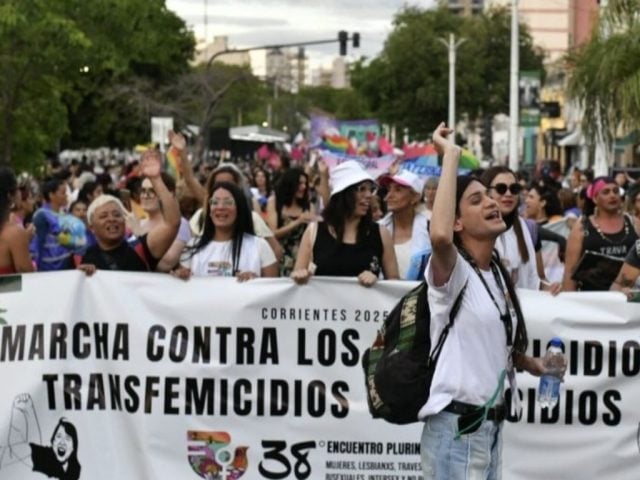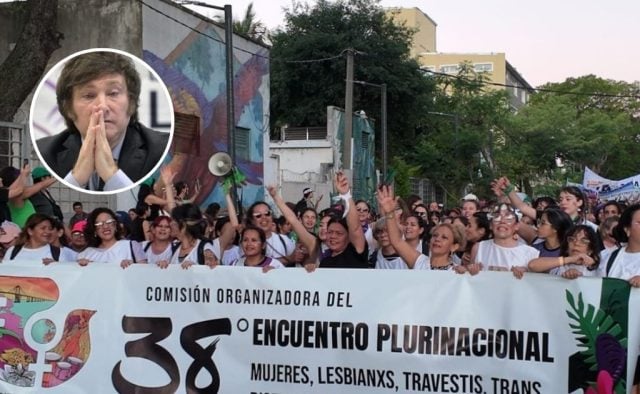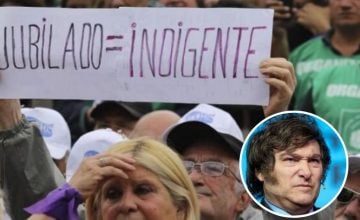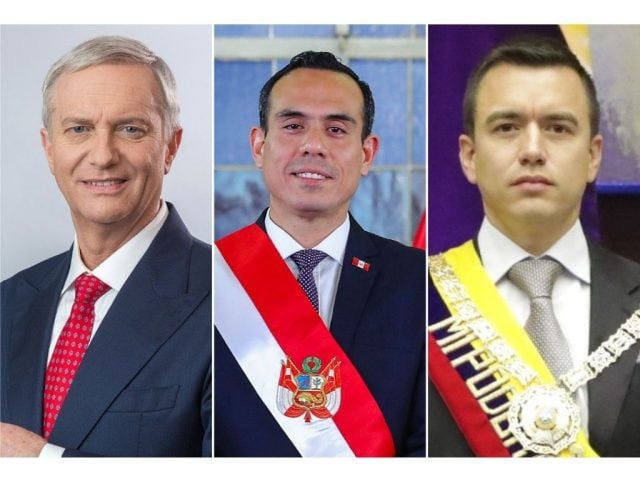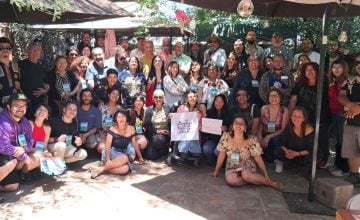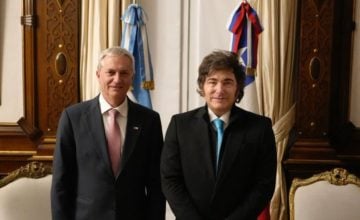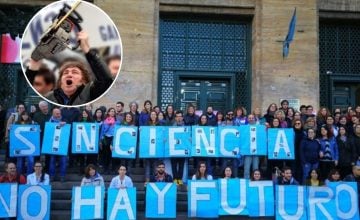Original article: Transfeminismo en pie de lucha: Encuentro Plurinacional cierra con agenda contra el ajuste de Milei
In the Argentine province of Corrientes, the strength of the transfeminist movement was on full display over three days at the 38th Plurinational Meeting of Women, Transvestites, Lesbians, Intersex, Non-Binary, and Binary individuals.
The event, which served as a space for resistance, attracted over 70,000 participants and concluded on Monday with the choice of Córdoba as the venue for the next gathering and the presentation of conclusions from workshops that outlined a common agenda opposing the austerity policies of the far-right government led by Javier Milei.
Established in 1986 in Buenos Aires as the Meeting of Women and modified in 2022, the Plurinational Meetings have come to symbolize significant political events that shape the pulse of the transfeminist movement and define the agenda discussed and organized each year.
This year’s edition featured demands to combat femicides, end hate speech, oppose attacks on gender policies, and address budget shortages, extractivism, and the exploitation of the Paraná River.
«It was the perfect setting to channel both the strength of working women, frustration from victims of gender-based violence, outrage over cuts to gender policies, and the fury of the trans community, and also to collectively envision the future of transfeminism and its possible constructs,» noted special correspondents Aldana Somoza and Maby Sosa in an article for El Tiempo Argentino, in collaboration with Agencia Presentes and the radio cooperative Mega 98.1 in Corrientes.
«Stop Femicides!»
During the gathering, thousands filled the streets of Corrientes last Saturday for a massive march covering 5 kilometers from the Poncho Verde roundabout to Costanera Sur.
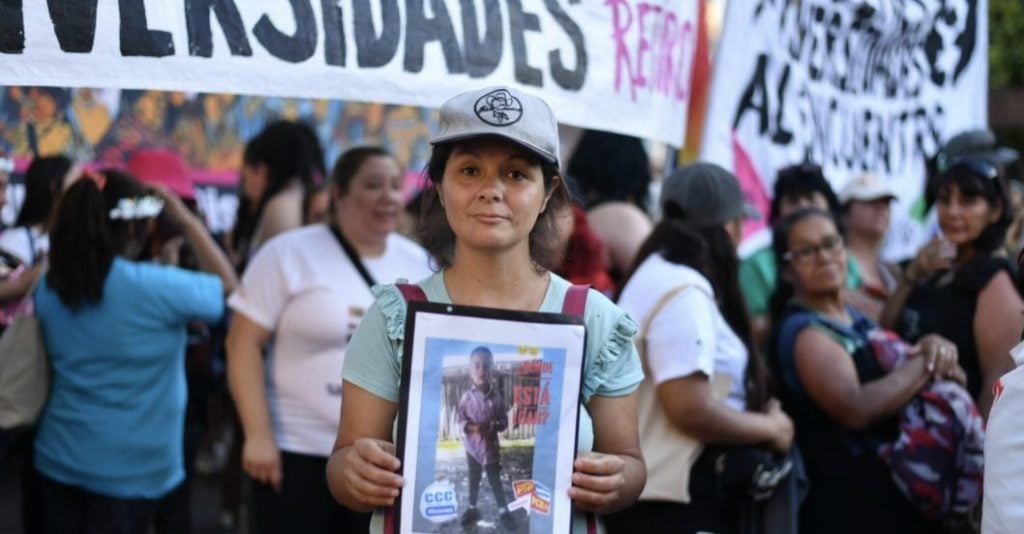
The leading group of marchers carried a banner featuring the face of Joan Peña, a five-year-old boy who went missing in June 2024 in Corrientes, whose whereabouts remain unknown, highlighting human trafficking as one of the pressing issues facing the movement. Behind them, a tide of slogans blended demands for legal abortion, the outcry of «Stop Femicides!», and chants against the government of the so-called libertarian.
“We gathered to march and put in the effort to stop the violence, to end hunger, and to ensure that women and diverse groups stop suffering from the policies of Milei’s government,” summarized Virginia, a representative of the Mocha Celis Popular High School, reflecting the widespread sentiment.
During the massive mobilization, there were denunciations of the increase in violence prompted by institutionalized hate speech from state agencies, manifesting as direct aggression against women, sexual minorities, and the LGBTIQ+ community.
Notably, the slogan: “What a moment, what a moment, despite everything we managed to hold the Meeting,” gained new significance after two years of continuous attacks from Milei’s far-right administration against the transfeminist movement.
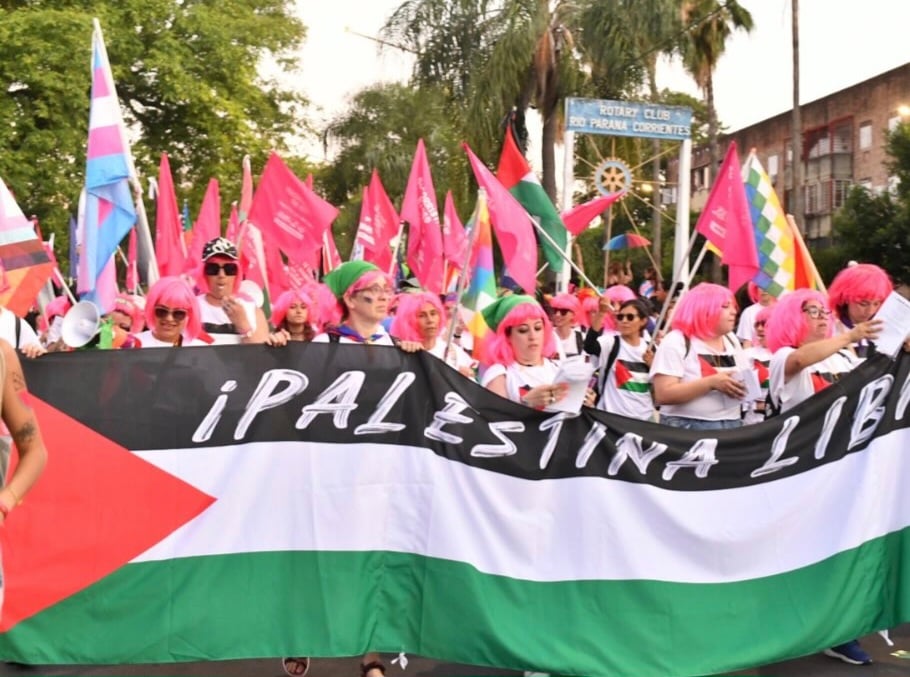
The march also showcased the wiphala flag of Indigenous peoples, who voiced their concerns against extractivist plunder and government oppression, along with Palestinian flags in protest against the genocide perpetrated by Israel in Gaza, which has resulted in the deaths of over 69,000 people, mostly women and children.
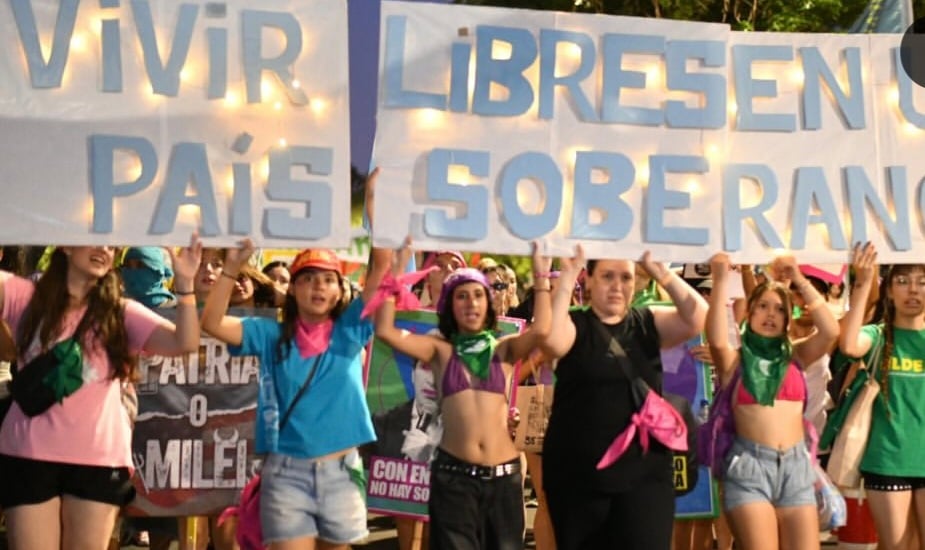
Organized Workers: Trade Unions as a Bastion
The second day took place at Parque Camba Cua, where formal and informal workers gathered in the feminist union bloc to voice their opposition against the threat of labor and pension reforms mandated by the International Monetary Fund (IMF), which would exacerbate their precarious conditions.
“We work in the sectors with the lowest salaries in general. We must continue fighting in a very adverse context where we need to discuss a project, knowing that union action without a political outlet isn’t enough,” stated Carla Gaudensi, General Secretary of the Argentine Federation of Press Workers.
She elaborated on the challenges faced by the sector: “We are under attack from this government not just because we are communicators but also because we are organized workers. Many colleagues are also experiencing precariousness, but we are primarily affected, and every time our activities feminize, the more precarious our work becomes,” she explained.
Within state media, Lorena Tapia Garzón denounced, “there is censorship on public television.”
Another worker from the same channel remarked, “those of us who work in public media have suffered stagnant salaries for almost 13 months.”
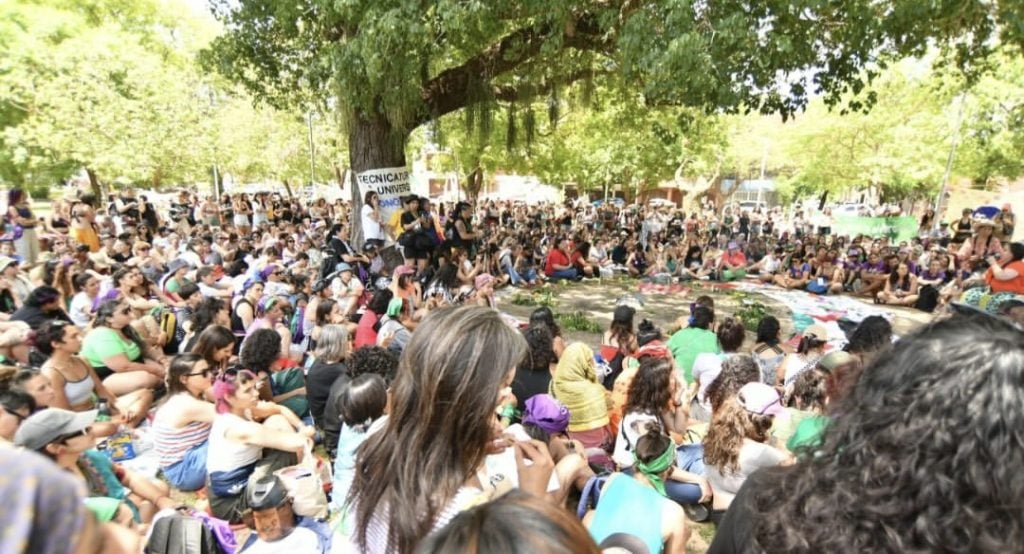
“When we go out to cover events, we are attacked; when we post something on social media, we are attacked because being women, being diverse, and wanting to raise our voice puts us in greater danger. We cannot allow anyone else to speak for us,” she argued.
Dina Sánchez, a leader from the Union of Workers of the Popular Economy (UTEP), broadened the focus to include informal economics.
“We need to elevate the agenda of our union and our popular economy. We believe it is crucial to discuss new ways to organize work. There is a sector that originates from informality, which has become a prevalent model in our society,” she insisted.
Sánchez also emphasized the need to bring visibility to care work, predominantly undertaken by women and diverse individuals.
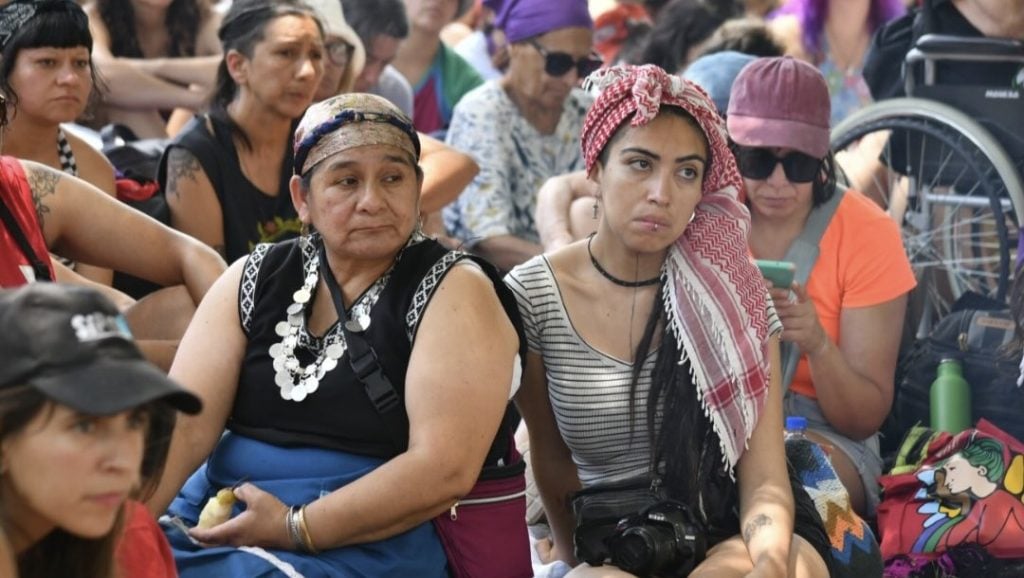
Defenders of Land and Indigenous Peoples Denounce State Persecution
On Sunday afternoon, Parque Camba Cua hosted the traditional Abya Yala assembly, where defenders of land and Indigenous peoples highlighted state persecution and extractivism as manifestations of patriarchy.
“We are not afraid of the Argentine state and its repression,” declared Luciana Jaramillo of the Winkul Mapu community, while denouncing the imprisonment of leaders Juan Pablo Colhuan and Facundo Jones Huala.
“Defending territory is not terrorism,” she emphasized.
Meanwhile, Lizzette Sánchez Díaz, granddaughter of Mapuche leader and land defender Julia Chuñil Catricura, raised her voice demanding truth and justice, one year after her grandmother’s enforced disappearance, last seen on November 8, 2024, in the Los Ríos region of southern Chile.
“They didn’t just murder her; they destroyed years of wisdom, labor, and love for the land. We don’t want more Julias, we don’t want more Macarenas Valdez, and it just so happens that these women are our lamien who have been murdered. And there is no justice for them,” stated the granddaughter of the president of the Putreguel indigenous community in Máfil.
Francisca Droguett, a water defender, connected ecological struggle with transfeminism.
“We are bodies of water, we are nature (…) extractivism is also patriarchy,” she said, denouncing the high rate of femicides and trans-femicides in mining areas.
“In the storm, feminism creates shelters, and this is ours,” she suggested, cited in the article published by El Tiempo Argentino.
From Salta, María Emilia Díaz of the chorote community and Pia Ceballos, a trans activist from the wichí people, spoke about state abandonment.
“We suffer from hunger, malnutrition, and lack of water,” Díaz stated, while Ceballos reiterated their commitment from their identity.
“As trans people, we renew our commitment; we defend water, our territory, and the land. The trans existence permeates every facet of our lives because we are survivors,” she indicated.
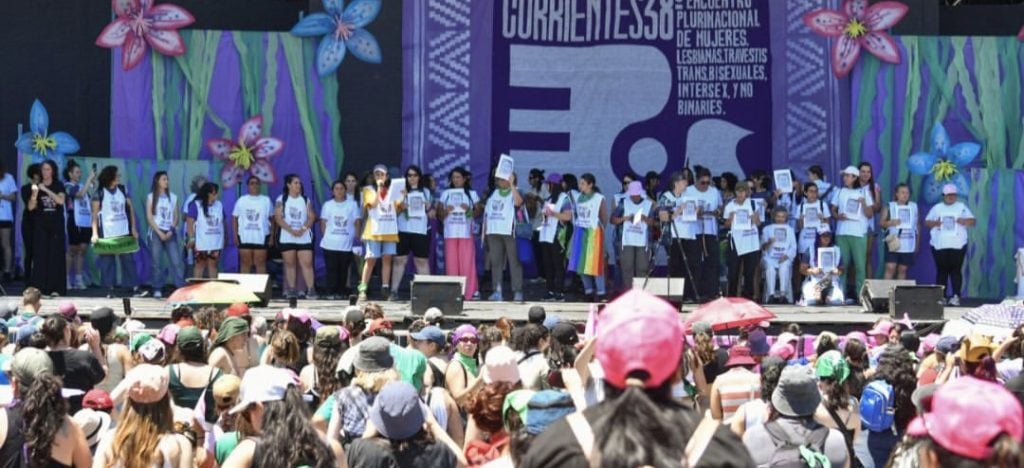
Transfeminism Stands Strong
With Córdoba selected as the host city for the 39th Meeting, the transfeminist movement has once again demonstrated its vitality and capacity for self-organization.
The message that emerges from Corrientes is clear: in a context where women and diverse groups are the primary targets of far-right policies—particularly from the administration of Javier Milei—transfeminism must unite, collaborate, and leverage its ability to mobilize. The fury has coalesced into a collective battle plan. History is being written, once again, in the plural.
*Featured Image: Agencia Presentes.
